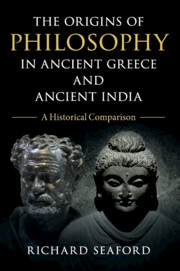Crossref Citations
This Book has been
cited by the following publications. This list is generated based on data provided by Crossref.
Loughnane, Adam
2020.
The Birth of Fire, Indescribable Light, and the Limits of Philosophy’s Violence: Nāgārjuna and Plato Seeing and Speaking of Nothing.
Comparative and Continental Philosophy,
Vol. 12,
Issue. 3,
p.
211.
Shevtsov, Sergii
2020.
A New Outlook on the Birth of Philosophy in Greece and India. Seaford, R. (2020). The Origins of Philosophy in Ancient Greece and Ancient India. A Historical Comparison. Cambridge: Cambridge University Press..
Sententiae,
Vol. 39,
Issue. 1,
p.
216.
Duchrow, Ulrich
2021.
The Commons in an Age of Uncertainty: A Review Essay.
The American Journal of Economics and Sociology,
Vol. 80,
Issue. 2,
p.
823.
Iordanoglou, Dimitrios
and
Tralau, Johan
2022.
Murder, Logic, and Embryology: The Beginnings of Political and Moral Philosophy in Aischylos’Oresteia.
Classical Philology,
Vol. 117,
Issue. 2,
p.
259.
Ciampa, Chiara Raffaella
2023.
Between Poetry, Philosophy and Medicine: Body, Soul and Dreams in Pindar, Heraclitus and the HippocraticOn Regimen..
Rhizomata,
Vol. 11,
Issue. 1,
p.
55.
Piliavsky, Anastasia
2023.
Hierarchy as a Democratic Value in India.
Current Anthropology,
Vol. 64,
Issue. 5,
p.
581.
Melleuish, Greg
and
Rizzo, Susanna
2023.
A Theological Age: A New Way of Looking at the History of the West.
Histories,
Vol. 3,
Issue. 2,
p.
156.
Schmidt, Kerstin
and
Loon, Joost van
2024.
Herausforderung Solidarität.
Vol. 10,
Issue. ,
p.
9.
Seaford, Richard
2024.
The Palgrave Handbook of Philosophy and Money.
p.
195.
Millhauser, John K.
and
Baron, Joanne
2024.
The Palgrave Handbook of Philosophy and Money.
p.
159.



